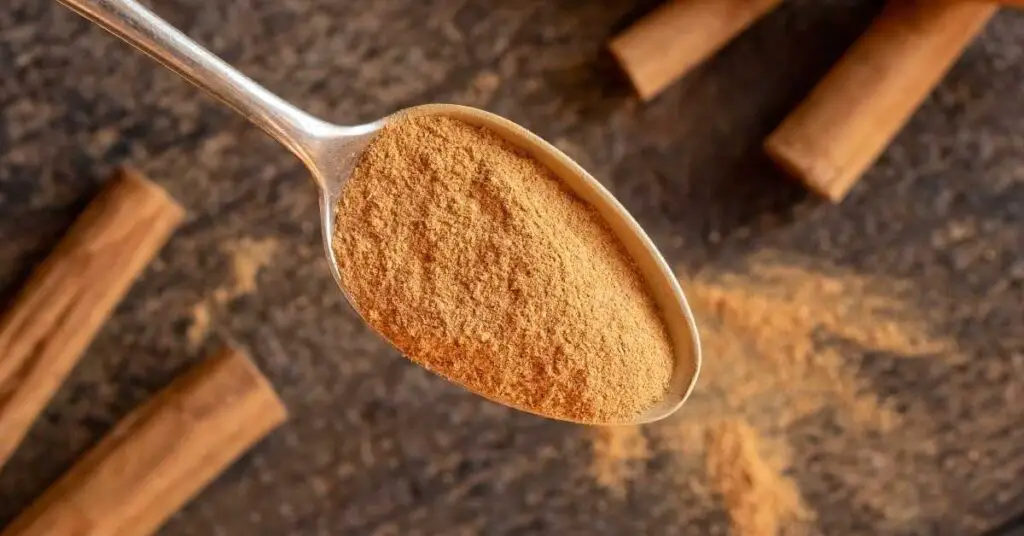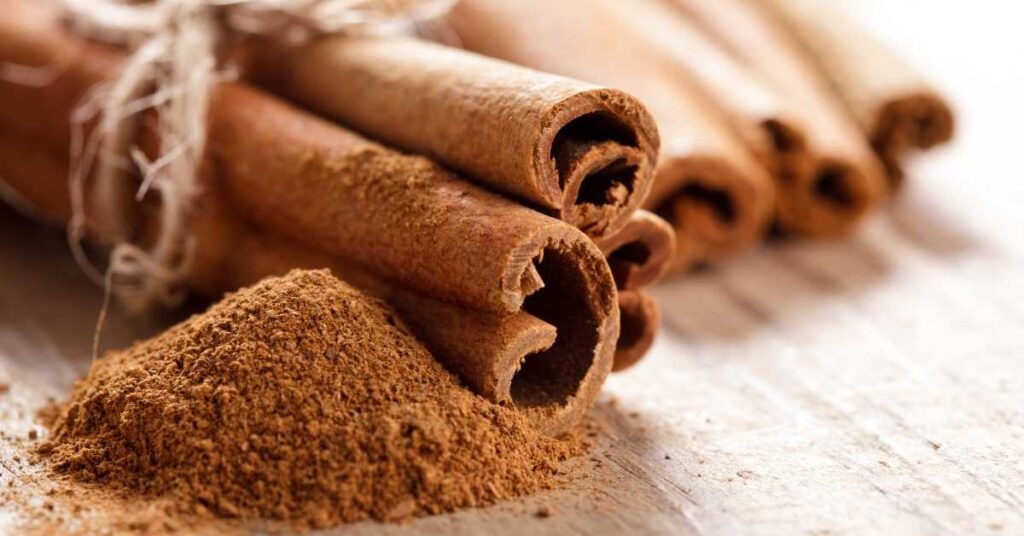In this blog post, I am going to talk about the popular spice, cinnamon, and debunk some common myths associated with it.
Cinnamon is a widely used spice around the world, known for its distinct aroma and warm flavor.
It is obtained from the inner bark of trees belonging to the Cinnamomum genus.
Cinnamon has been used for centuries in traditional medicine and culinary practices.
Why It’s Important to Debunk Cinnamon Myths?
There are several myths and misconceptions surrounding cinnamon that need to be clarified.
By debunking these myths, we can ensure that people have accurate information about cinnamon and its benefits.
Some common myths include:
- Cinnamon cures diabetes: While cinnamon may have some beneficial effects on blood sugar levels, it is not a substitute for medical treatment or a cure for diabetes.
- All types of cinnamon are the same: There are different types of cinnamon, such as Ceylon cinnamon and Cassia cinnamon, which differ in taste and aroma. It is important to choose the right type for specific recipes.
- Cinnamon is toxic: In small amounts, cinnamon is safe for consumption. However, consuming excessive amounts of cinnamon or taking cinnamon supplements may have adverse effects.
- Cinnamon is a weight loss miracle: While cinnamon may have some impact on metabolism and weight management, it is not a magic solution for weight loss.
By debunking these myths, we can ensure that cinnamon is used and consumed in a safe and informed manner. It is important to rely on scientific evidence and expert advice when incorporating cinnamon into our diet and lifestyle.
Myth 1: Cinnamon is Harmful in Large Amounts

In this section, let’s unravel the truth behind the myth that cinnamon is harmful when consumed in large quantities. It’s important to address this misconception to ensure that people have accurate information about cinnamon’s safety.
Exploring the truth behind cinnamon toxicity
While it is true that consuming excessive amounts of cinnamon can have adverse effects, it’s important to note that this applies to any food or spice. Cinnamon contains a compound called coumarin, which in high concentrations, can potentially be harmful to the liver and cause other health issues. However, it’s vital to understand that the levels of coumarin in cinnamon can vary depending on the type.
Understanding safe consumption levels
To consume cinnamon safely, it is recommended to choose Ceylon cinnamon over Cassia cinnamon. Ceylon cinnamon has significantly lower levels of coumarin, making it a safer option. The European Food Safety Authority has set a tolerable daily intake (TDI) for coumarin at 0.1 mg per kilogram of body weight. By following this guideline, you can enjoy the flavor and potential health benefits of cinnamon without worrying about excessive intake.
It’s always important to remember that moderation is key when it comes to any food or spice. By being mindful of the type and amount of cinnamon we consume, we can enjoy its distinct flavor and aroma while ensuring our well-being.
Myth 2: Cinnamon Can Cure Diabetes
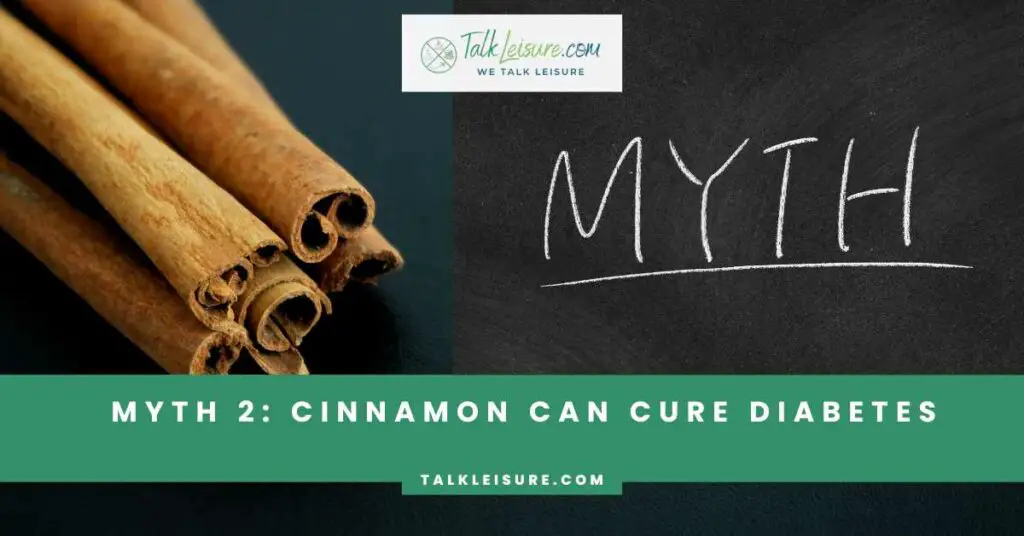
In this section, let’s explore another popular myth surrounding cinnamon and its supposed ability to cure diabetes. It’s important to provide accurate information to dispel misconceptions and promote a realistic understanding of cinnamon’s role in managing blood sugar levels.
Examining the effectiveness of cinnamon in managing blood sugar levels
While cinnamon has been studied for its potential to help regulate blood sugar levels, it is essential to note that it cannot cure diabetes. Research suggests that cinnamon may have some positive effects on insulin sensitivity and glucose metabolism. However, these effects are generally mild and may vary between individuals.
Discussing the limitations and potential risks
It’s important to understand that the impact of cinnamon on blood sugar levels is not a substitute for medical treatment or proper diabetes management. It should be used as an adjunct to a balanced diet, regular exercise, and prescribed medications or insulin therapy. Additionally, cinnamon may interact with certain medications or have adverse effects on individuals with liver conditions or allergies. It’s crucial to consult with a healthcare professional before using cinnamon as a natural remedy for diabetes.
In summary, while cinnamon may have some beneficial effects on blood sugar levels, it cannot cure diabetes. It is essential to rely on evidence-based medical treatments and consult healthcare professionals for proper management of diabetes.
Myth 3: Cinnamon Can Aid in Weight Loss
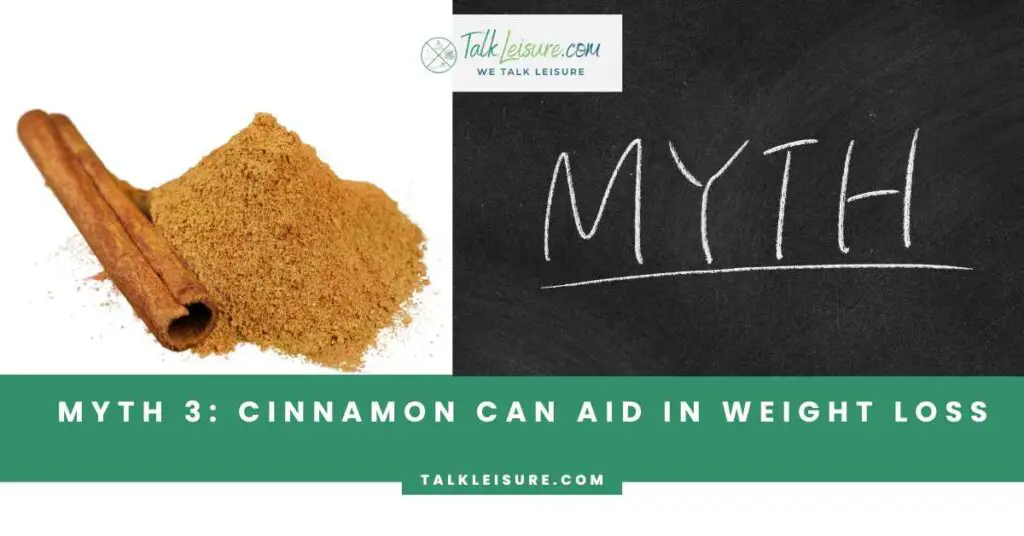
In this section, let’s examine another common myth that suggests cinnamon can help with weight loss. It’s important to provide accurate information to dispel misconceptions and promote a realistic understanding of cinnamon’s role in managing body weight.
Analyzing scientific studies on cinnamon’s impact on metabolism
While there have been some studies investigating the potential effects of cinnamon on metabolism and weight loss, it’s important to approach these findings with caution. The available evidence is limited and often conflicting.
Some studies suggest that cinnamon may have a slight impact on certain metabolic processes, including improving insulin sensitivity, reducing inflammation, and potentially promoting weight loss. However, these effects are generally modest and may vary between individuals.
Separating fact from fiction
It’s essential to understand that cinnamon should not be viewed as a magical weight-loss solution. Simply adding cinnamon to your diet without making other sustainable changes, such as maintaining a balanced diet and engaging in regular physical activity, is unlikely to result in significant weight loss.
Relying on cinnamon alone for weight loss is not recommended. It’s crucial to adopt a holistic approach that includes healthy lifestyle habits like mindful eating, portion control, and regular exercise to achieve and maintain a healthy weight.
In summary, while cinnamon may have some potential benefits for metabolism and weight management, it is not a standalone solution for weight loss. It’s important to focus on overall healthy habits rather than relying solely on cinnamon as a weight-loss aid.
Myth 4: Cinnamon Can Prevent or Cure Cancer
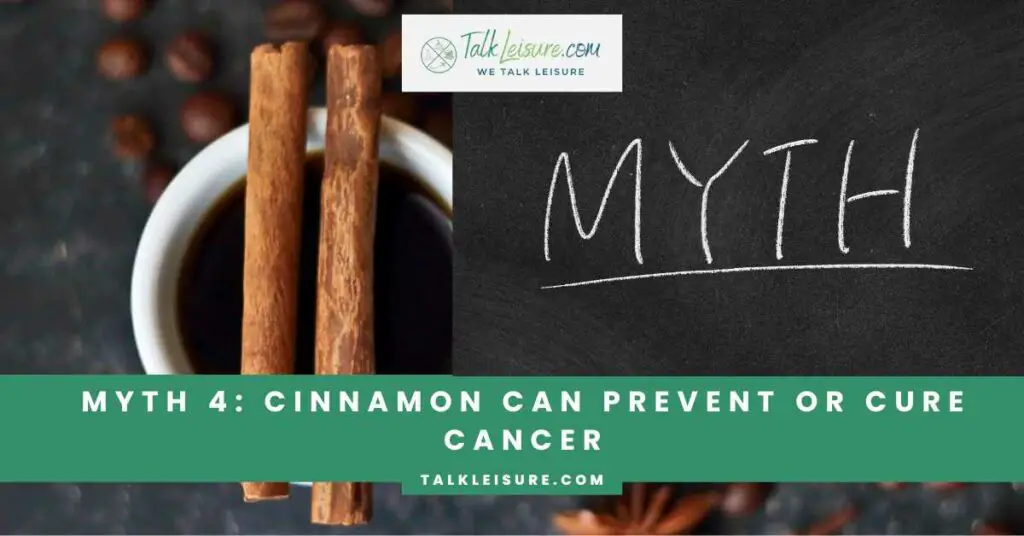
In this section, let’s explore another common myth that suggests cinnamon has the ability to prevent or cure cancer. It’s important to provide accurate information to dispel misconceptions and promote a realistic understanding of cinnamon’s role in cancer prevention and treatment.
Investigating the anti-cancer properties of cinnamon
Cinnamon has been traditionally used for its medicinal properties and has been researched for its potential anti-inflammatory and antioxidant effects. Some studies have indicated that cinnamon extract may have certain compounds that could inhibit the growth of cancer cells in test tubes.
However, it’s important to note that laboratory studies are not always indicative of how a substance will behave in the human body. Further research is needed to determine the specific mechanisms behind cinnamon’s potential anti-cancer properties and its effectiveness in humans.
Understanding the current scientific evidence
At present, there is limited clinical evidence supporting the claim that cinnamon can prevent or cure cancer in humans. The available studies are usually small in scale and may have limitations in their design and methodology.
While cinnamon may have potential health benefits, it is crucial to approach claims of its cancer-fighting abilities with caution. It should not be relied upon as a standalone treatment for cancer.
In conclusion, while cinnamon shows promise in terms of potential anti-cancer properties, more research is needed to fully understand and validate these claims. It is important to rely on evidence-based treatments and consult with healthcare professionals for guidance on cancer prevention, diagnosis, and treatment.
Myth 5: Cinnamon Can Lower Cholesterol Levels
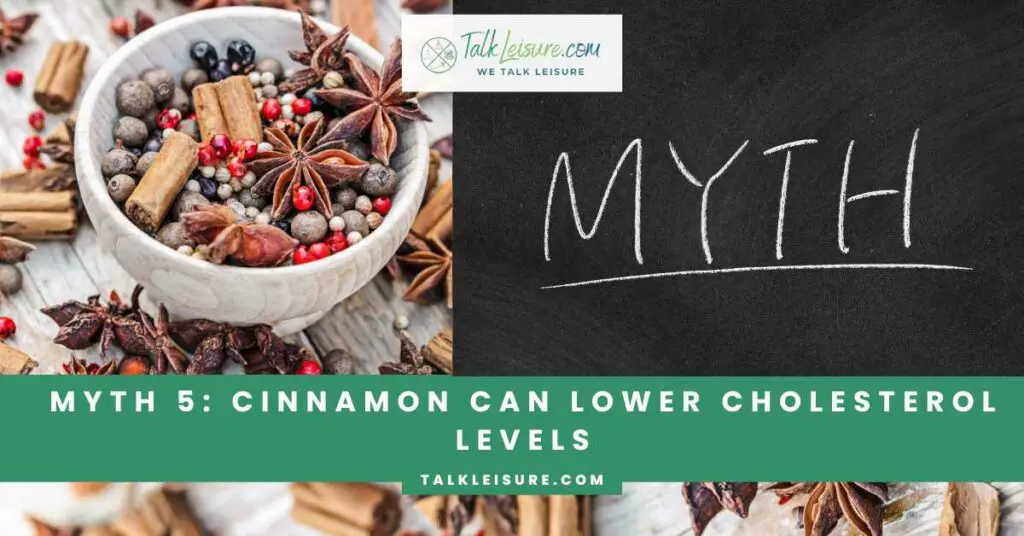
In this section, let’s revisit another common myth surrounding cinnamon and its potential to lower cholesterol levels. It’s important to approach this topic with a critical mindset and understand the current scientific evidence.
Reviewing studies on cinnamon’s effects on cholesterol
Cinnamon has been studied for its potential ability to improve cholesterol levels. Some research suggests that cinnamon may have a positive impact on reducing LDL (bad) cholesterol and triglyceride levels, while increasing HDL (good) cholesterol.
However, it’s important to note that the studies conducted so far have been small and may have limitations in their methodology. More research is needed to fully understand the impact of cinnamon on cholesterol management.
Identifying other factors for cholesterol management
While cinnamon may show potential in improving cholesterol levels, it should not be relied upon as the sole solution for managing cholesterol. Lifestyle modifications such as adopting a healthy diet, engaging in regular physical activity, and avoiding smoking play a crucial role in maintaining optimal cholesterol levels.
Moreover, individuals with high cholesterol should consult with their healthcare professionals for personalized advice and consider evidence-based treatments along with any potential benefits cinnamon may offer.
In conclusion, while there is some evidence suggesting cinnamon may have a positive impact on cholesterol levels, it is essential to incorporate a holistic approach to cholesterol management. Relying solely on cinnamon as a solution may not be sufficient, and individuals should focus on adopting an overall healthy lifestyle and seeking guidance from medical professionals.
Myth 6: All Types of Cinnamon are The Same

In this section, let’s debunk the myth that all types of cinnamon are the same. Understanding the differences between Ceylon cinnamon and Cassia cinnamon is important in order to make informed choices when using cinnamon in cooking or for medicinal purposes.
Differentiating between Ceylon cinnamon and Cassia cinnamon
Ceylon cinnamon, also known as “true cinnamon,” is derived from the inner bark of the Cinnamomum verum tree. It is pale brown in color and has a delicate, sweet flavor. On the other hand, Cassia cinnamon, derived from the Cinnamomum cassia tree, is darker in color and has a stronger, more pungent taste.
Highlighting the variations and their implications
The differences between Ceylon cinnamon and Cassia cinnamon extend beyond their taste and appearance. Cassia cinnamon contains higher levels of coumarin, a natural compound that can be toxic in large amounts. In contrast, Ceylon cinnamon has much lower levels of coumarin, making it a safer choice for those who consume cinnamon regularly.
When it comes to choosing cinnamon for culinary purposes or using it as a natural remedy, it is important to be aware of these variations. Opting for Ceylon cinnamon ensures a milder flavor and lower risk of potential toxicity.
Ultimately, understanding the differences between Ceylon cinnamon and Cassia cinnamon allows individuals to make informed decisions and select the cinnamon variety that best suits their needs and preferences.
Myth 7: Cinnamon is a Natural Preservative
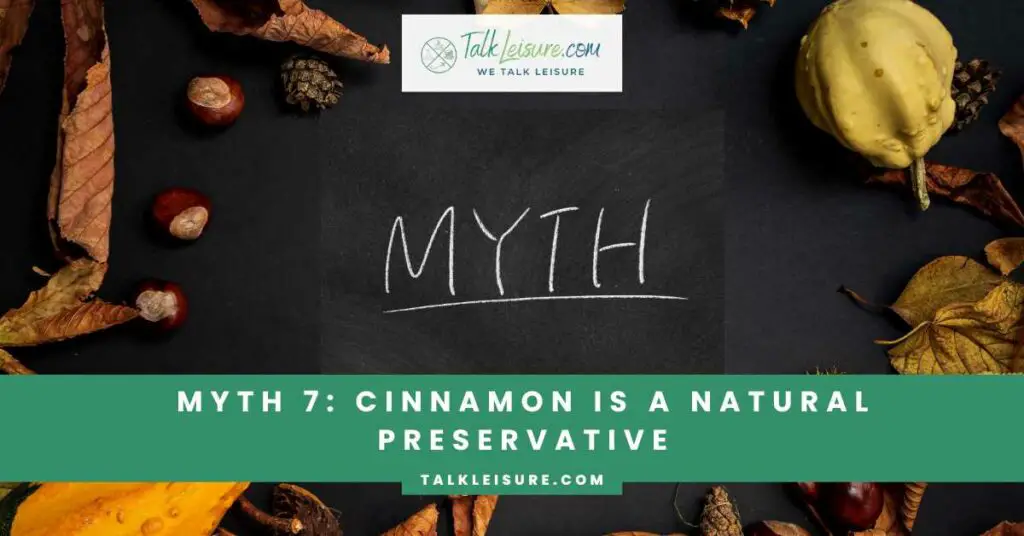
In this section, let’s uncover the truth about cinnamon’s preserving abilities and explore alternative food preservation methods. While cinnamon does have some antimicrobial properties, it is important to understand its limitations when it comes to preserving food.
Uncovering the truth about cinnamon’s preserving abilities
While cinnamon does possess antimicrobial properties, these properties are not strong enough to be considered a reliable natural preservative. While it may inhibit the growth of certain bacteria and fungi, it is not effective at preventing spoilage over an extended period of time. Therefore, relying solely on cinnamon to preserve food may lead to foodborne illnesses or spoilage.
It is essential to properly store and handle food to prevent spoilage, regardless of whether cinnamon is used or not. Refrigerating perishable foods, using airtight containers, and following proper food safety guidelines are much more effective in preserving food than solely relying on cinnamon.
Exploring Alternative Food Preservation Methods
There are alternative ways to preserve food naturally without relying solely on cinnamon. Some popular methods include:
- Home canning: Using heat to sterilize and seal food in jars, allowing them to be stored for long periods of time.
- Drying: Removing moisture from foods to prevent the growth of bacteria and fungi.
- Fermenting: Encouraging beneficial bacteria to thrive and prevent harmful microorganisms from growing.
These methods, along with proper storage and handling practices, can help extend the shelf life of food and reduce the risk of foodborne illnesses.
In conclusion, while cinnamon does possess some antimicrobial properties, it is not a reliable natural preservative. It is important to understand its limitations and explore alternative food preservation methods that are more effective in preventing spoilage and ensuring food safety.
Conclusion – Recapping the Debunked Cinnamon Myths
Throughout this section, we have explored and debunked several myths surrounding cinnamon. Let’s recap what we’ve learned:
Myth 1: Cinnamon can cure diabetes. The truth is that cinnamon can help regulate blood sugar levels to some extent, but it is not a cure for diabetes. Proper medical treatment and lifestyle changes are essential for managing diabetes.
Myth 2: Cinnamon can aid in weight loss. While some studies show that cinnamon may have a positive impact on metabolism and insulin sensitivity, it is not a magic weight loss solution. A balanced diet and regular exercise are the keys to healthy weight management.
Myth 3: Cinnamon can prevent or cure cancer. While cinnamon does contain antioxidants, which have been linked to cancer prevention, it is not a standalone treatment for cancer. Medical interventions and treatments should be sought for cancer management.
Myth 4: Cinnamon is completely safe for everyone. Although cinnamon is generally safe for consumption in small amounts, it can cause adverse reactions or interact with certain medications in some individuals. It is important to be aware of any potential risks and consult a healthcare professional if needed.
Myth 5: Cinnamon can lower cholesterol. While some studies suggest that cinnamon may have a minor effect on reducing LDL cholesterol levels, it should not be relied upon as the sole treatment for high cholesterol. A healthy lifestyle and prescribed medications are crucial for managing cholesterol levels.
Myth 6: Cinnamon is a natural aphrodisiac. There is no scientific evidence to support the claim that cinnamon has any aphrodisiac properties. Its culinary uses should be enjoyed for their flavor and aroma rather than any supposed amorous effects.
It is important to rely on accurate information and scientific evidence when evaluating the uses and benefits of cinnamon. While it does have some health benefits, it is not a cure-all or a substitute for medical advice. Incorporating cinnamon into a balanced and varied diet can be a flavorful addition, but it is important to maintain overall healthy habits for optimal well-being.
Best Wishes!




